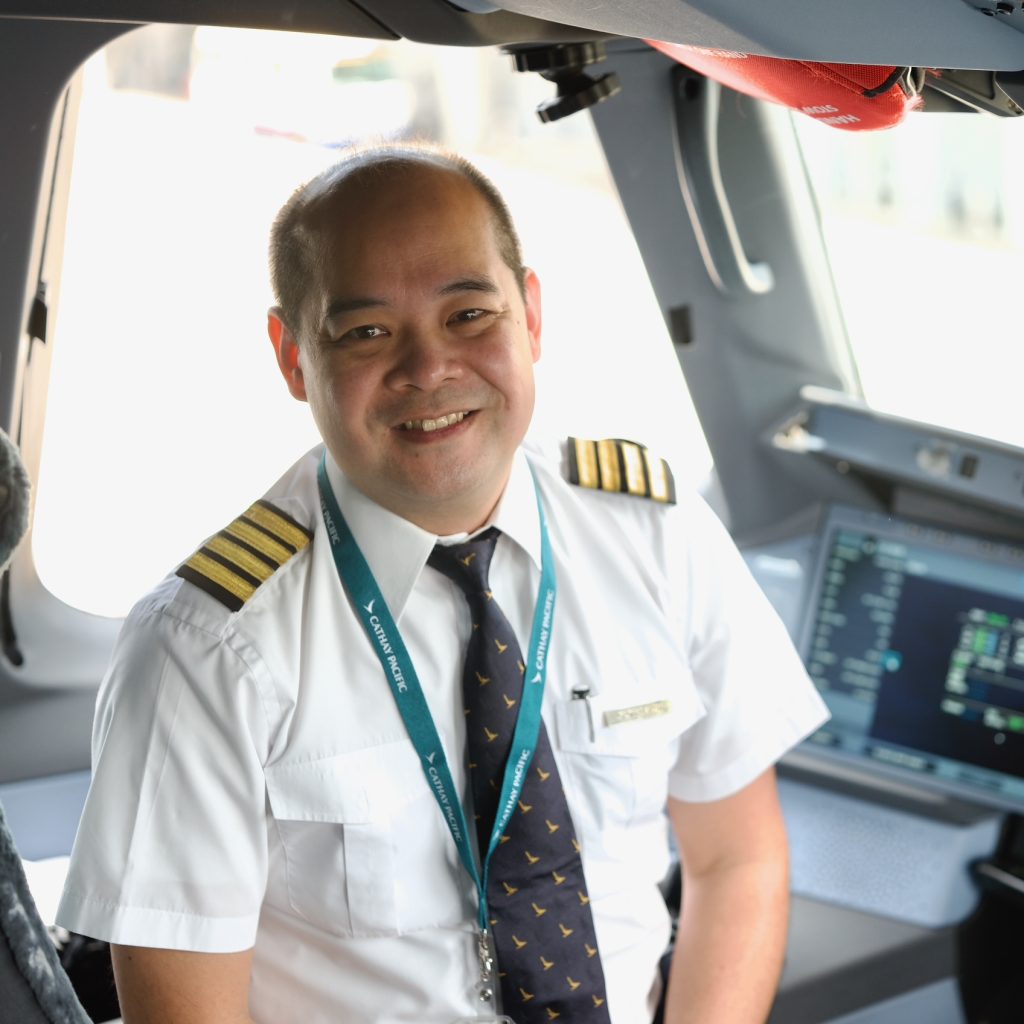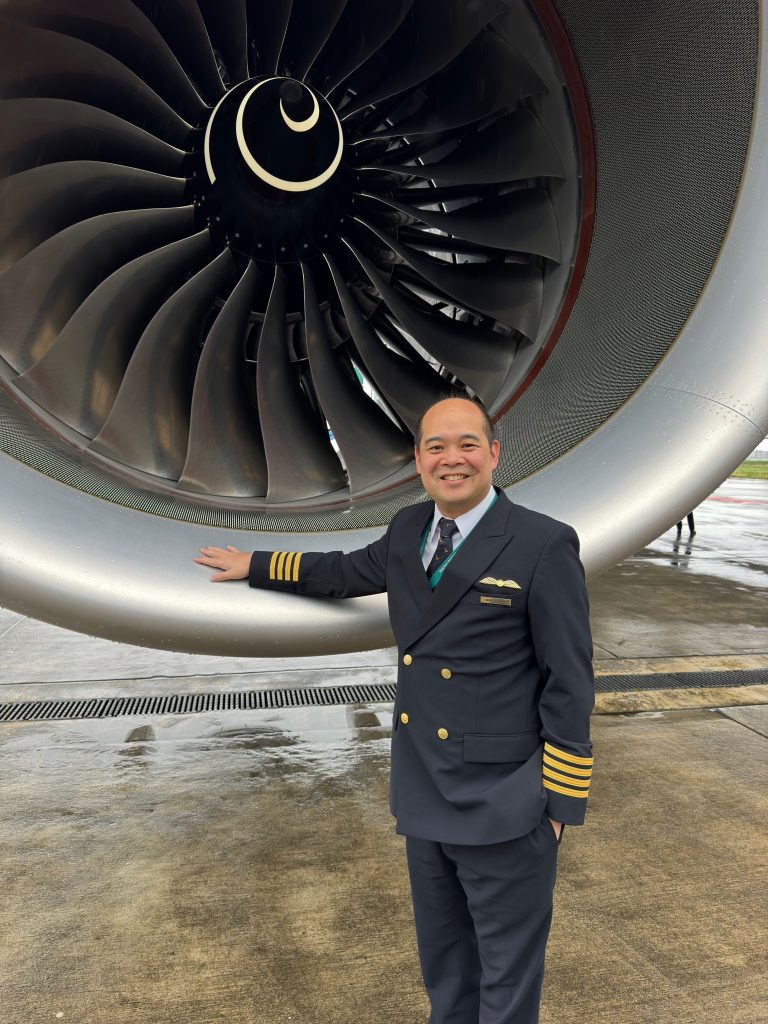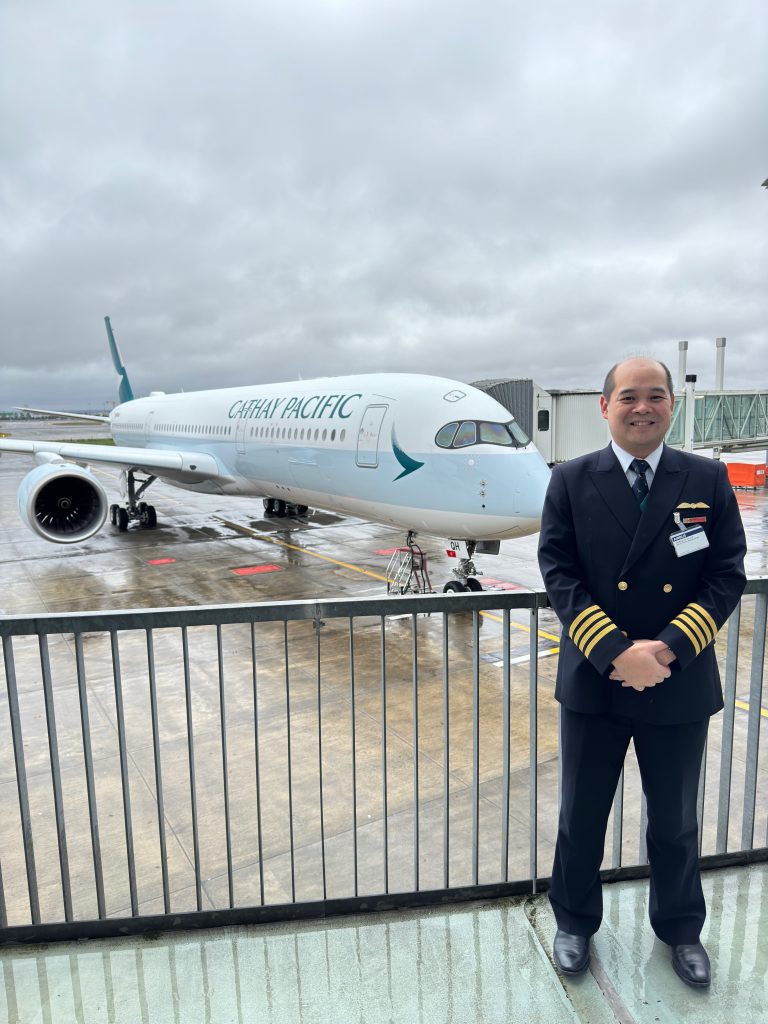Geoffrey is the Chief Pilot (Airbus) at Cathay Pacific. He was most recently involved in the Kai Tak Tribute Flight CX8100, commemorating Kai Tak Airport’s 100th anniversary. The low-altitude flight passed Central, Wan Chai, Kai Tak Stadium and North Point through the harbour in what was a memorable piece of aviation history. Here is his story about how he became a pilot, some memorable experiences along the way, and what it was like to be heavily involved in the recent Kai Tak Tribute Flight.
Name: Geoffrey Lui
Graduating Year: 1995
Current place of residence: Hong Kong
About the Kai Tak Tribute Flight
Flying over Hong Kong to commemorate Kai Tak must have been nostalgic. What emotions or memories came up during the flight, especially knowing its history and your own personal connection to aviation in Hong Kong?
This was a process which kicked off around six weeks before the actual flight. The aim was always to create something memorable for all who saw it fly past, be it in person or on YouTube! The magnitude of the event and what we were doing was not lost on us. As we lined up for our run, and seeing the harbour was clear of any low cloud or bad visibility did give a wow moment and elation that the event will be able to carried out, was a welcome sight indeed! Having grown up on the Kowloon side and spending time around the Kowloon Tong area whilst growing up, all I hope was to recreate the memories of seeing aircraft close up, and some of the noise!
The Kai Tak approach was famously difficult. What were the biggest challenges in recreating this flight for a modern aircraft?
For us, the logistics were about making this event happen! Our main aim was safety, and the amount of work by the team to make it work, together with getting a low-flying exemption from the Civil Aviation department, was phenomenal, so I guess on the day whilst doing the flight, I was more relieved than anything! As hard as we tried, we could not in this short lead time obtain approval to fly over the stadium to recreate the flight path over Kowloon. What we did do in the end had its challenges too; while not the first plane to do a low-altitude flyby over the harbour, the Airbus A380 and Comac C919 had done so previously, more than the first A350 to fly down the harbour, we were the first to come westbound back through the harbour, which is more challenging with the terrain and buildings around, whilst trying to get as close to the stadium as possible.
As a CIS alumnus and now Chief Pilot at Cathay, what would you say to young CIS students and alumni who dream of becoming pilots, especially after seeing your flight?
Never give up on your dream. Nothing is impossible. I was once just like you at school, dreaming about being a pilot. Work hard and be passionate about aviation; opportunities will always present themselves. Being a pilot is not just another job; it can be the best job in the world, but only if flying an airplane is truly what you want to do; otherwise, a lifetime of being examined and being held to a high standard will come wearing very quickly.

About Your Role as Chief Pilot at Cathay Pacific:
As Chief Pilot, what does your role entail beyond flying? How do you balance leadership, safety, and mentoring the next generation of pilots?
As the Chief Pilot of the Airbus fleet, I only get to fly once or twice a month. My time is split between looking after the pilots whom I’m responsible for, maintaining oversight of how our crew are operating the planes, and working with other departments/entities (eg Airbus), to manage the operation.
What do you see as the biggest challenges for Cathay Pacific and commercial aviation in the next decade (e.g., sustainability, pilot shortages, geopolitical factors)?
On a local scale, pilot recruitment is an ongoing project, with the retirement of our longer-serving pilots needing to be replaced, together with supporting the growth of Cathay in the coming decade. As you might be aware, we have many planes on order and to be able to fully utilise them, both recruitment and training of pilots will be at the forefront of our radar.
Looking slightly broader, with Cathay having such a sprawling route structure, geopolitical exposure is high. As an example, the decision to avoid overflying Russian airspace to Europe has meant an increase in flight time of more than an hour each way. While it might not seem significant, it has placed a huge burden on the operation with not only the increased cost of fuel, but also complexities in numerous areas, including the availability of reliable GPS signals, and more complex routings and overfly rights.
The industry on the whole is in a strong position in that everyone is striving for increased efficiency and sustainability. Airbus has a target of ‘net–zero carbon emissions by 2050’, and the innovations are genuinely revolutionary in their efforts to achieve their goal.
Looking back, what has been the most rewarding moment of your career so far?
For every pilot, there are three significant milestones.
1: Going solo
2: Becoming a professional pilot
3: Becoming a Captain
Completing one’s command (Captain) course is always going to be memorable as it is a hugely rewarding accomplishment, and for me it was no different. What is notable is that at every point of your career, every achievement opens doors to new opportunities; it never stops.

About Your Career Journey:
How did your time at CIS shape your career path? Were there any teachers or experiences that inspired you to pursue aviation?
My time at CIS played a huge role during my formative years. This was a time pre-Braemar Hill, and the school was on the campus on Borrett Road. The close-knit community was only a few classes. While I remember many of my teachers, Mr Ngai, my Chinese teacher, was particularly memorable. I was not the strongest at Chinese, yet somehow I did not fail too many of my exams/tests, due to his persistence and patience, which I can confidently say was far superior to mine!
Every career has ups and downs. What were some of the toughest moments in your journey, and how did you push through them?
Not many people are natural at their jobs; we all have good days and bad days. One can look at ups and downs in a pilot’s career like in other jobs; however, by nature of what we do, you are judged every time we go to work, be it whether you are managing issues well, or as simply as if the landing was good or not. Irrespective of what metric you want to use to measure success, what I would say is take everything, good or bad, as a lesson on what we can do better the next time.
If you could give one piece of advice to your younger self at the start of your career, what would it be?
Every little bit matters; embrace the challenge that you can always do better, and more than anything, enjoy the journey.
What do you like to do in your spare time or as a hobby?
I like to spend time at home with the family and friends. Cooking seems to be my favourite pastime!
